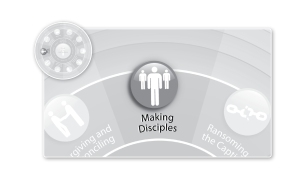Part VII of our series on Making Disciples
 If we could sum up the previous six posts and distill from them one major point, it would be this: equipping others to grow to fullness in Christ under the power of the Holy Spirit requires an “aggressive, comprehensive, systematic plan for discipleship.”
If we could sum up the previous six posts and distill from them one major point, it would be this: equipping others to grow to fullness in Christ under the power of the Holy Spirit requires an “aggressive, comprehensive, systematic plan for discipleship.”
Those are the words of D. Michael Henderson, one of my favorite aggressive, comprehensive, systematic disciplers. A trainer of African church leaders and author of several excellent books on discipleship, Henderson says that discipling people is best understood as a curriculum in the truest sense of the word:
“Curriculum is a Latin word that means ‘racetrack.’ A racetrack has some basic elements: a starting point, a finish line, boundaries, and rules. Educational experts describe a curriculum in terms of its scope and sequence, that is, the range of material or skills to be mastered and the order. In most cases, a curriculum is a set of ordered steps toward a predetermined goal.”
Question: Is curriculum just for schoolteachers and educational experts or does it describe a genuinely biblical process?
Answer: It’s the Great Commission! It’s Matthew 28:20!
As we talked about last week, Jesus’ final words to the disciples before ascending into heaven in Matthew were in Matthew 28:20, “and teach them to obey everything I have commanded you.”
Notice that that’s something more than, “and share with them the plan of salvation,” or “and lead them to a saving knowledge of me.”He says, “Teach them to obey everything I have commanded you.” There’s 28 chapters of everything, friend. And teaching it requires an aggressive, comprehensive, systematic plan.
Sadly, however, most of us have a discipleship plan that goes something like this:
- Step 1: Listen sympathetically as a friend shares what they’re experiencing in life.
- Step 2: Offer a relevant Bible story or Scripture to encourage or even challenge them a little bit.
- Step 3: Repeat Step 1.
Do you see how this approach ends up being driven by the student’s needs and life and problems? Do you see how that’s not a fulfillment of the Great Commission command to “teach them to obey everything”?
Jesus was very responsive to people’s needs. But that’s not what he called discipleship.
Discipleship is not the process of meeting people’s needs. It’s the process of learning to obey everything Christ commands. And if you’re a discipler whose discipleship agenda is set by your student, you’re not going to achieve that.
Brian Eckhardt, the General Superintendent of the Evangelical Church, says it’s like being a student in medical school. If a student enrolled in medical school, it’s pretty much a given that the curriculum is not going to be set by his interests.
“Yeah, I’m not really interested in learning about the circulatory system. I’m really much more interested in starting with the muscle tissue, because I have this really sore back, and…”
Huh?
This would never happen in a medical school, but it happens all the time in Christian discipleship. The teacher ends up acting as a counselor, and the discipleship relationship ends up being therapy.
Therapy is not discipleship. In fact, it’s the opposite.
In discipleship the teacher sets the agenda and makes sure to teach everything Christ has commanded. But in the backward process, the student sets the agenda and the teacher becomes a dispenser of advice—like a Pez dispenser only with advice coming out. Like Christ is a Magic 8 Ball. Remember those? Have a problem in life? Shake the Magic 8 ball and see what the answer is.
“Maybe.”
“Probably.”
“Don’t do that.”
But Christ never permits himself or the things of God to be jumbled around like a Magic 8 Ball. Take, for example, his conversation with the woman he meets at the well in Samaria.
In just a few short verses, Jesus crosses social boundaries, reveals himself to be the Messiah, and talks about salvation. But the conversation doesn’t progress like you might think. Jesus takes the Samaritan woman’s question and flips it around her, telling her what she should be asking.
“If you knew who it was to whom you were speaking…” he says.
And then she says, “Say, there’s something we’ve always wondered about. We Samaritans say we should worship here, and you Jews say you should worship there, and—”
“Wrong question,” says Jesus. I set the agenda here. I need to teach you even the right questions to ask, because you will not stumble onto even the right questions based on your own needs and circumstances.
Discipleship is not about us answering the questions that interest others about Jesus.
It’s not about us doing Scripture therapy to apply the right verse to whatever else those who speak to us. It’s about Jesus the medical professor. He sets the curriculum. We teach it. Others learn it. We all apply it.
“Teach them to obey everything I have commanded you.”
“Yes, sir. Right away, sir.”
That’s how we roll. We surrender the agenda of our own needs and concerns in order to prioritize growth to fullness in Christ. And that means disciplining ourselves to sacrifice chatty personal conversations and have redemptive, Christ-centered ones instead.
What do you think? Are there other differences between therapy and discipleship? Do the two ever overlap and, if so, where?











Pingback: Four Elements for Every Discipleship Conversation | Rev. Eric Foley